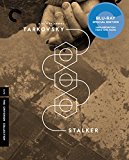| Reviews & Columns |
|
Reviews DVD TV on DVD Blu-ray 4K UHD International DVDs In Theaters Reviews by Studio Video Games Features Collector Series DVDs Easter Egg Database Interviews DVD Talk Radio Feature Articles Columns Anime Talk DVD Savant Horror DVDs The M.O.D. Squad Art House HD Talk Silent DVD
|
DVD Talk Forum |
|
|
| Resources |
|
DVD Price Search Customer Service #'s RCE Info Links |
|
Columns
|
|
|
Stalker: Criterion Collection
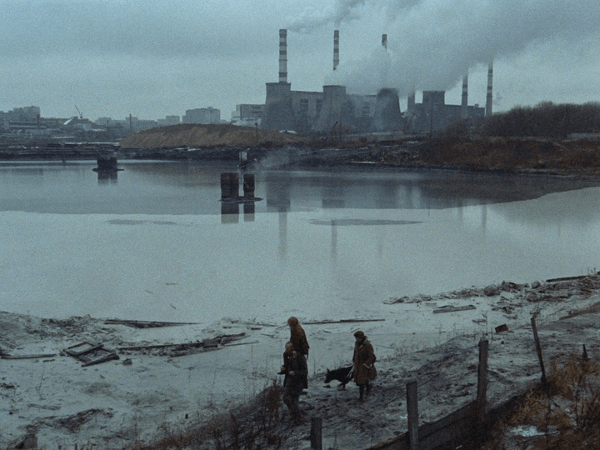 Andrei Tarkovsky's final film made in his home country, Stalker (1979) is as beautifully shot, ponderous, and polarizing as you'd expect from the celebrated Russian director. Less than half a dozen characters have speaking parts and only a few more are seen during its languid 161-minute lifespan, during which three men travel through a shifting landscape in search of a room believed to grant the wishes of those who find it. Known only by their professions, The Writer (Anatoli Solonitsyn) and The Professor (Nikolai Grinko) are in search of said room: it lies somewhere within "The Zone", a mysterious area guarded by military forces and whose reason for existence is never clearly defined. Their guide is a Stalker (Alexander Kaidanovsky), whose namesake group ushers in paying clients at great personal risk for all involved. Recently, Stalker has risked the relationship with his wife (Alisa Freindlich) and their daughter (Natasha Abramova), who are resentful of the trips that keep him away from home. Regardless of his wife's warnings, soon enough all three men depart on a journey from which they may not return. It's apparent almost immediately that Stalker, like its title character, seems to write its own rules as it slowly unfolds. Nothing is as it seems from start to finish, and first-time viewers' expectations will be subverted around every corner...long before our characters arrive at The Zone just shy of the 40-minute mark, and even more so during the next two hours. Dialogue is often limited to philosophical musings by The Writer and The Professor, usually in the form of arguments, while Stalker provides exposition as he slowly leads them through back alleys, barbed wire, decaying rural landscapes, dark tunnels, winding paths, and other visually memorable landscapes. Only two rules seem definitive: they can't travel in a straight line, nor can they go back the way they came. Almost impossible to explain in a thematic sense, Stalker is neither less nor more than the sum of its parts; it's something else entirely, and first-time viewers with clear expectations will find themselves frustrated, impatient, and possibly transfixed. Its story continually subverts expectations, features almost no payoff, and has been cited as an allegory for politics, religion, and countless other broad topics. Those relatively new to Tarkovsky's body of work will either love it or hate it, but they'll unquestionably remember Stalker for its bold, transcendent visuals and hypnotic, numbing atmosphere.
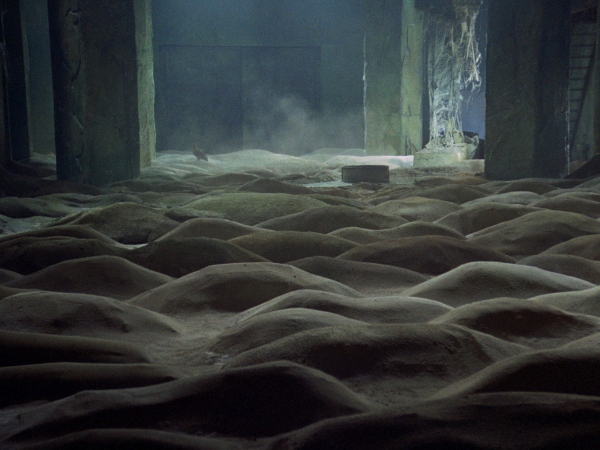 No shortage of problems arose during the production of Stalker, whose story was changed so many times that its final cut barely resembles the 1971 novel (Roadside Picnic, written by Arkady and Boris Strugatsky) on which it was based. The first and most famous was that an entire year's worth of footage, shot by first cinematographer Georgy Rerberg, was improperly developed and completely unusable. This setback represented a huge loss that almost doomed the project, both for financial reasons and the understandable frustration of Tarkovsky. Yet the director persisted, suggesting a two-part format to secure additional funds and drastically changing its story in the process. The shoot was long and dangerous, and Tarkovsky even survived a heart attack during post-production. These problems are overshadowed by the fact that several members of Stalker's cast and crew died under similar circumstances several years later. Vladimir Sharun, the film's sound designer, noted that one of the shooting locations was near a chemical plant that polluted the surrounding air and water with white foam that resembled snow; this can even be glimpsed during one of Stalker's later scenes, seen in the first image above. All told, at least three people succumbed to lung cancer during the next two decades: Anatoly "The Writer" Solonitsyn (d. 1982), Tarkovsky himself (d. 1986), and his second wife / assistant director Larisa (d. 1998). Factor in the Chernobyl disaster seven years after the film's release, and you've got one more eerie layer of mystique that looms over almost every frame of what many consider to be Tarkovsky's greatest film. Regardless of your opinion of its story, Stalker is an outstanding visual achievement that plays exceptionally well on Criterion's new Blu-ray. Sourced from a new 2K restoration, die-hard fans will be extremely pleased with the depth, texture, and clarity of this 1080p transfer: bookended by golden sepia and highlighted by foreboding darkness, the film has never looked better on home video and, barring an eventual 4K release, likely never will. A handful of bonus video interviews also allows us to peek further behind the curtain without attempting to fully answer Stalker's endless supply of questions.
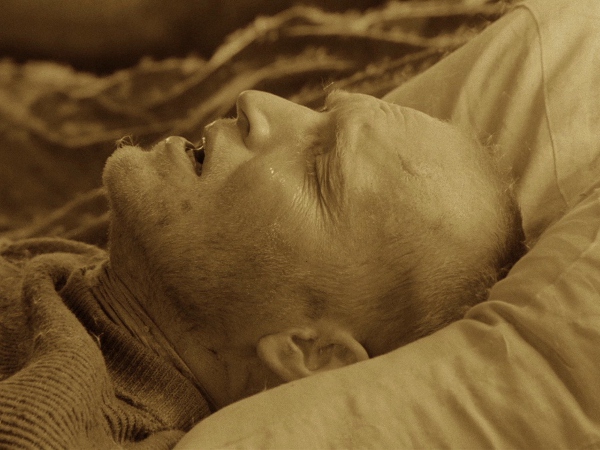 Presented in its original 1.37:1 aspect ratio, this new 2K-sourced 1080p transfer of Stalker objectively looks fantastic from start to finish, and represents a sizable jump in quality from Kino's 2006 DVD. Perhaps the most noticeable difference here is during the sepia-toned scenes: before, they were somewhat muddled and dingy, but now they absolutely burst with golden color and high contrast details. The color "Zone" scenes also look more evenly saturated, if not a bit too cyan-tinted as a lot of Criterion discs have in recent years. But overall, it's almost all good news: black levels are much more consistent, image detail and textures are improved, and the film's occasionally dense grain structure is represented perfectly well from start to finish; the result is an extremely clean, natural, and crisp appearance. No obvious digital imperfections or manipulation (including compression artifacts, interlacing, excessive noise reduction, etc.) could be spotted along the way, either. Stalker absolutely deserves the extra spit and polish that it's gotten here.
There's less to say about the PCM 1.0 track, aside from that it presents as convincing an atmosphere as possible for a one-channel track. Dialogue, background effects, and Eduard Artemyev's score are crisp and clear without fighting for attention, while the overall experience showcases many moments of hypnotic depth at times. This lossless mono presentation seems true to the source material and purists will enjoy the lack of surround gimmickry. Optional English subtitles are included for translation purposes only.
 As usual, Criterion's interface is very smooth and easy to navigate. This one-disc release is locked for Region A players; it's packaged in their typical "stocky" keepcase with striking cover artwork and text design. The included fold-out Insert features notes about the new restoration, technical credits, and an essay by film critic Mark Le Fanu.
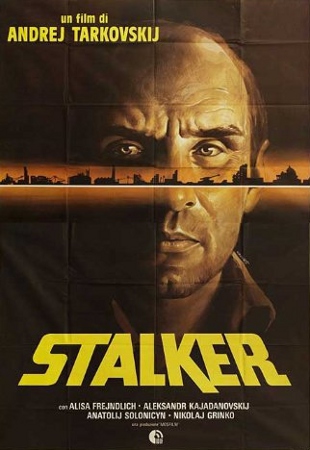 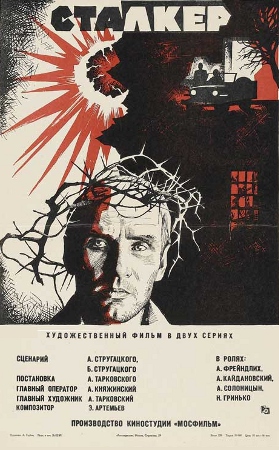
 Though limited on paper, what's here does a wonderful job of supporting Stalker without giving away too much of its mystique. These include four different Video Interviews from crew members and scholars who each share a different perspective on what Stalker means (or meant) to them. It's also worth noting that only the first interview is exclusive to Criterion's Blu-ray, as the remaining three are ported from previous DVDs. Newest to oldest, then. Geoff Dryer (29:11), author of Zona: A Book About a Film About a Journey to a Room, speaks about seeing the film during its first run in London, and how his impatient first viewing eventually led to decades of appreciation for Tarkovsky's work. Recorded in 2017, Dryer also examines the director's visual style, his personal beliefs, and how both changed during a life tragically cut short. (English, not subtitled) Composer Eduard Artemyev (21:10) and set designer Rashit Safiullin (14:24), recorded separately in 2000, speak about their direct involvement with the film. Artemyev pays tribute to the director and discusses their sporadic interactions during the troubled production; his interview ends with a montage of the director set to music. Safiullin gives more of a technical account that includes building certain sets and dealing with financial troubles, most of which stemmed from the year's worth of lost footage. Though well worth watching, it's disappointing that we couldn't get a recent interview with either participant as both are still very much alive and well. (Russian, with English subtitles) Ending things on a poignant note, the short interview with cinematographer Alexander Knyazhinsky (5:54) was his last before passing away in 1996. Though obviously in poor health, Knyazhinsky (who took over for Georgy Rerberg after the ruined film debacle) speaks fondly of his contributions to Stalker and also recalls a story about the black dog his crew encountered during filming in Estonia. (Russian, with English subtitles)
 Like most of Andrei Tarkovsky's work, 1979's Stalker is a beautifully shot, ponderous, and polarizing affair. Visually hypnotic as it travels between worlds, it's the kind of film that can really transfix viewers in the right mood...but at a daunting 161 minutes, it might not be the best introduction for Tarkovsky newcomers. Regardless, Criterion's new Blu-ray is a most welcome effort: the extras (though limited in new material) offer plenty of support, and the new 2K-sourced transfer is far ahead of all previous home video releases. It's a strong effort that established fans will appreciate. Highly Recommended.
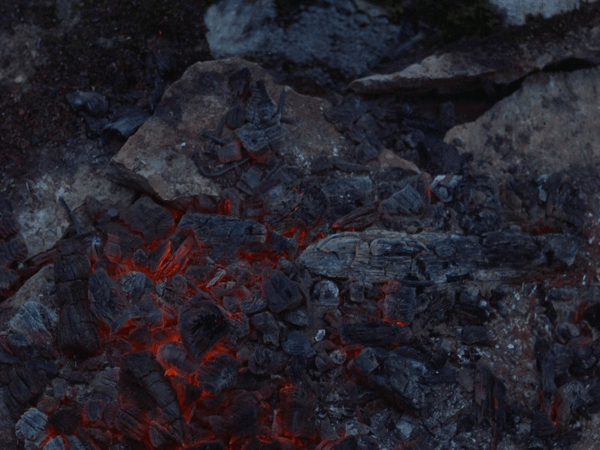 |
|
| Popular Reviews |
| Sponsored Links |
|
|
| Sponsored Links |
|
|
| Release List | Reviews | Shop | Newsletter | Forum | DVD Giveaways | Blu-Ray | Advertise |
|
Copyright 2024 DVDTalk.com All Rights Reserved. Legal Info, Privacy Policy, Terms of Use,
Manage Preferences,
Your Privacy Choices | |||||||











